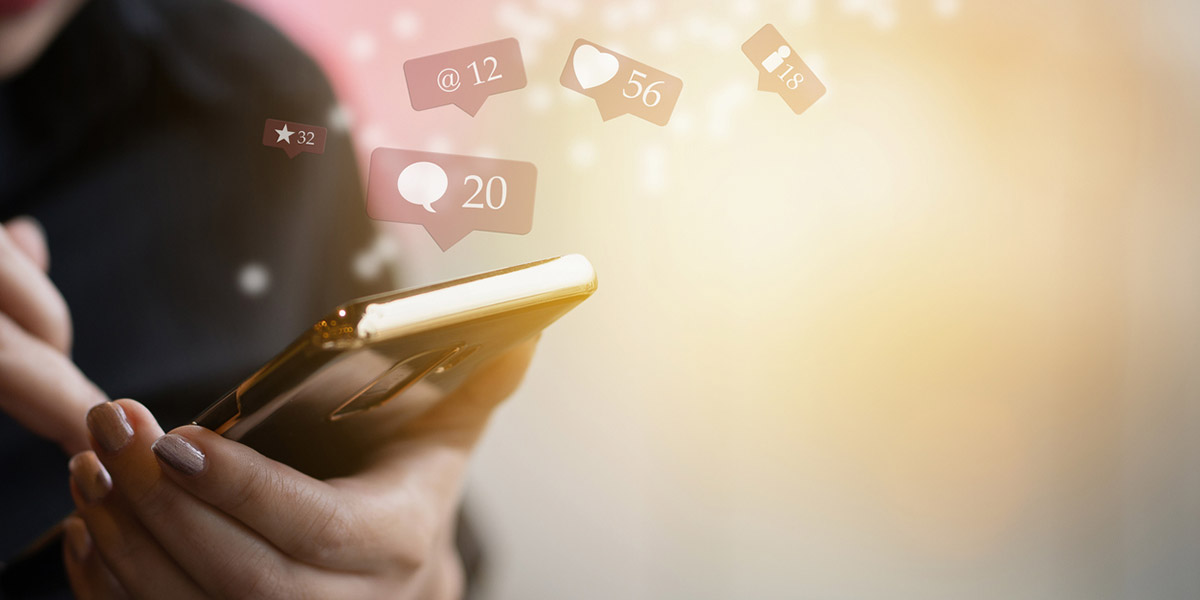Social media platforms such as Twitter, Instagram, Facebook, and Reddit have dramatically increased our ability to learn from and communicate with people from around the globe.
Unfortunately, they have also made it much easier for people to be misled by misinformation campaigns, develop unrealistic expectations, and be victimized by online bullies and trolls.
Several studies have demonstrated the negative effects that social media use can have on a person’s mental health. But recent research suggests that artificial intelligence, machine learning, and related advancements can harness the ubiquity of social media to identify people who can benefit from professional treatment.
Though significant technical challenges and ethical concerns stand between these efforts and their full implementation, we may be getting closer to the day when social media posts are used to diagnose bipolar disorder and other mental illnesses.
What Is Bipolar Disorder?
To detect the presence of bipolar disorder or any other mental health condition, it is important to first understand the common signs and symptoms of the disorder in question.
Identifying signs of bipolar disorder can be complicated a bit by the fact that this is a general term that encompasses three mental health conditions (bipolar I disorder, bipolar II disorder, and cyclothymic disorder). Each of these conditions can cause dramatic shifts in mood, energy level, and related characteristics. But the prevalence and severity of these symptoms varies among the three disorders.
Two general indicators of bipolar disorder are manic episodes and major depressive episodes:
- During manic episodes, people experience symptoms such as inflated self-confidence, elevated energy level, increased motivation, impulsive behaviors, and little need for sleep.
- During major depressive episodes, people struggle with symptoms such as fatigue, overwhelming sadness, diminished ability to concentrate or focus, and a pervasive sense of hopelessness.
The three types of bipolar disorder are differentiated by the types and severity of a person’s symptoms:
- For a diagnosis of bipolar I disorder, a person must have at least one manic episode. People who have bipolar I disorder may also have depressive episodes, but these are not required for this diagnosis.
- The criteria for bipolar II disorder include having at least one hypomanic episode and at least one depressive episode. Hypomanic episodes are similar to manic episodes, but the symptoms may be less severe or shorter in duration.
- Cyclothymic disorder is defined by depressive symptoms that don’t rise to the level of a major depressive episode and hypomanic symptoms that are not acute enough to qualify as a hypomanic episode.
The Negative Impact of Social Media on Mental Health
The potential negative impact of social media on mental health has been a significant concern for many years.
The topic received widespread attention in September 2021, when a whistleblower from Facebook revealed that the organization’s own research revealed disturbing trends among adolescent girls who used Instagram (which is owned by Meta, Facebook’s parent company).
As reported by the Wall Street Journal, an internal Facebook presentation about social media and mental health included the following statements:
- 32% of teen girls said when they weren’t happy with their bodies, spending time on Instagram made them feel worse.
- Among those who struggled with suicidal ideation, 13% of British teens and 6% of Americans said Instagram contributed to these thoughts.
- Teens have identified Instagram as a cause of increased feelings of anxiety and depression.
Among people who have bipolar disorder, impulsivity – and the aftermath of impulsive behaviors – can be sources of particular concern. This topic was explored in a December 2021 study that was published by the journal Bipolar Disorders.
This study evaluated the ramifications of interactions on social media in general and on dating apps specifically. The results indicate that impulsive online activities can, indeed, be problematic for people who have bipolar disorder.
The researchers found that the rate of “regretted behavior” was more than twice as high among those with bipolar disorder than in the control groups. The elevated rate of regret was consistent in both categories: general social media use and dating app use.
Other reports have linked social media use with isolation, diminished self-esteem, elevated stress, and a general decline in overall mental well-being.
However, there is evidence that some social media use can have a beneficial impact on people who have mental health concerns.
For example, a May 2019 research article in the journal Frontiers in Communication found that positive Tweets about bipolar disorder from influential people who have the disorder resonated with Twitter users a month after the initial postings.
The author of this article noted that her evaluation “reveals a positive frame shift in social media users across Twitter, highly encouraged by bipolar opinion leaders that serves as inspiration for other diagnosed bipolar individuals to recover, thrive, and prosper.”
Identifying Signs of Bipolar Disorder via Twitter Use
Recently, researchers have begun to investigate the benefits of analyzing social media behaviors for the purpose of identifying people who may have mental illnesses. Hopefully, this would result in expanded access to care for those who may not otherwise be connected with the help they need.
An August 2022 study in the journal Informatics in Medicine Unlocked explored the potential of using artificial intelligence and machine learning to create a unified model to detect symptoms of bipolar disorder through social media.
In their introduction to the study, the authors mentioned the following obstacles to effectively diagnosing bipolar disorder using traditional methods:
- It is difficult for clinicians to track people while they are experiencing different types of episodes.
- Patients may intentionally or unintentionally fail to accurately describe the symptoms they have been experiencing.
- Financial concerns and lack of access to mental health experts can undermine a person’s ability to be accurately diagnosed.
The authors proposed a unified model that could evaluate Tweets, with a focus on the following characteristics:
- Polarity and emotion: The model analyzed for nine features to determine if the person was expressing positive, negative, or neutral emotions.
- Phonetic association: During manic episodes, a person may focus on the sound of their speech instead of the meaning they are conveying. The researchers’ model assessed Tweets in terms of rhythm, rhyme, and punctuation.
- Sleep-wake cycle: The model identified when a person was awake and Tweeting. Compiling this information over time allowed the researchers to note significant changes that may indicate that an individual has been sleeping much more or much less than usual.
- Number of daily Tweets: A significant uptick in a person’s Twitter usage could suggest that they were in the midst of a manic or hypomanic episode.
To test the effectiveness of their model, the researchers used it to assess the Tweets of 1,089 Twitter users. This number included 89 users who had self-identified as having bipolar disorder before the assessment began, and 1,000 other randomly selected accounts.
The unified model assessed more than 2.9 million Tweets from these users over a 16-month period (Jan. 1, 2018 – April 30, 2019).
The authors did not use this model to diagnose any of the randomly selected users with bipolar disorder. However, they proposed a method that would involve the following steps:
- Gathering data (Tweets) from people who have bipolar disorder and those who have not been identified as having this disorder
- Processing this data and extracting certain features (such as the characteristics listed above)
- Comparing the data from users with bipolar disorder to random users
- Training a model to identify users who may have bipolar disorder
- Using this model as a diagnostic tool
In their preliminary work, the authors identified phonemes, phonetics, polarity, and emotion as features that appear to be most valuable in terms of predicting who may or may not have bipolar disorder.
The authors noted that considerable work remains to be done in pursuit of an effective model for using this type of data to for diagnostic purposes. Areas for further research, they noted, include the following:
- Assigning proper value to certain features collected in the data
- Determining differences within stages of bipolar disorder
- Differentiating bipolar disorder from other mental health concerns (such as borderline personality disorder and depression) that share certain symptoms
Detecting Mental Health Disorders Through Reddit Posts
The 2022 effort to identify people who have bipolar disorder through their Twitter use was not the first formal attempt to assess online interactions for indicators of mental illness.
In November 2020, the open access research-sharing website arXiv (which is maintained by Cornell University’s Cornell Tech program) published a study titled “Detection and Classification of mental illnesses on social media using RoBERTa.”
This study used machine learning to identify the following five types of mental illness from posts on Reddit:
- Anxiety
- Attention-deficit/hyperactivity disorder (ADHD)
- Bipolar Disorder
- Depression
- Posttraumatic stress disorder (PTSD)
The researchers created a dataset by crawling 13 subreddits. Five of the subreddits (bipolar, adhd, anxiety, depression and ptsd) were directly related to the disorders listed above. The other eight (music, travel, india, politics, english, datasets, mathematics, and science) were devoted to a variety of general topics.
The researchers used the RoBERTa(Robustly Optimized BERT Pretraining Approach) language model, which is an adapted version of BERT (Bidirectional Encoder Representations from Transformers) to assess the Reddit posts they had collected. BERT is a machine learning model for natural language processing that was released in 2018 by a team from Google.
The authors of the 2020 study noted the following findings:
- Their model was successful at identifying posts that were unrelated to mental illness.
- Among posts that the model identified as related to mental illness, it was most successful with the topics of ADHD and PTSD.
- The model’s performance was least effective at identifying posts related to depression and anxiety.
Similar to what the authors of the 2022 study found, the 2020 researchers also noted that shared symptoms among disorders complicated the model’s ability to accurately classify certain posts:
- The word “depression” word was present in 31% of posts about bipolar disorder, 12% of posts about anxiety, and 12% of posts about PTSD.
- The word “anxiety” occurred in 20% of posts about PTSD, 12% of ADHD posts, and 14% of posts about bipolar disorder.
- The words “depression” or “anxiety” were more likely to occur in posts from the adhd and ptsd subreddits than in posts from the depression and anxiety
The authors of the 2020 study wrote that they hope to continue their work on this topic, with the goal of using natural language processing models to “bridge the gap between virtual and real life of [social media] users” and connect people in crisis with the care they need.
Getting Help Today
If you or someone that you care about has been experiencing the symptoms of bipolar disorder, please know that effective treatment is available today. Crownview Psychiatric Institute offers personalized treatment and comprehensive wraparound support for adults whose lives have been impacted by bipolar disorder and other complex mental health concerns. Contact us today to learn more about our programs and services.


 Gianna Melendez
Gianna Melendez Jodie Dahl, CpHT
Jodie Dahl, CpHT